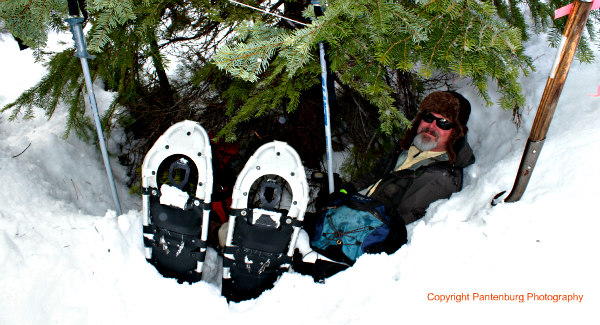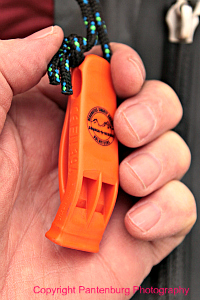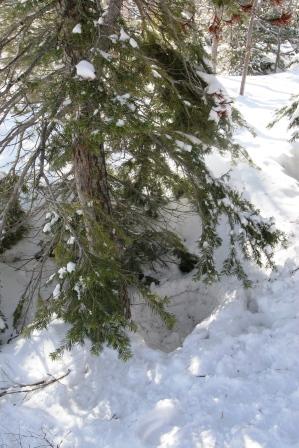

| Online: | |
| Visits: | |
| Stories: |

| Story Views | |
| Now: | |
| Last Hour: | |
| Last 24 Hours: | |
| Total: | |
How to Turn a Tree Well into an Emergency Snow Shelter in Only Ten Minutes

What if you are lost, all you have to make a shelter with is your skiis and poles, a snow shovel, insulite pad and a tarp. Here’s how, and in under ten minutes!
~~~~~
Here’s the scenario: You’ve been out snowmobiling, snowshoeing or Nordic skiing in deep snow. Toward the end of your trip and without much warning, dark clouds blow in, the wind picks up a notch, and it starts to snow. Maybe your sled has gotten stuck in a snow ditch and you’re all alone. Maybe you took a wrong turn and you’re confused about the signs. Or, it’s taking longer to get back than you planned and you’re worried you won’t make it by dark. Now you’re really nervous, in fact a bit scared. This happens every winter, in regions all over the country.
Whatever the case, you have to make a decision. You’re tired, you’re sweating a bit, it’s getting colder, and snowing harder. You need to make a shelter – fast. It’s best to keep calm, and dig in for the night, than to risk hypothermia in the dark. Let’s assume you have excellent winter clothing and good boots, gloves and warm headgear. That’s critical to surviving in a snow shelter.
The technique for making an emergency tree well shelter was taught to me by Jim Prestwood, a former Deschutes County (Oregon) Search and Rescue volunteer with 15 years experience. Do it the right way, he teaches, and you can make a safe shelter from the storm in about ten minutes.
But, in order to build a shelter, you have to have the tools. Always have your Ten Essentials Gear with you on any outing. And before you go anywhere in deep snow, make sure to have the right equipment along.
Add to your Ten Essentials whenever you go out in the snow.
Snow shovel: This should be a sturdy tool that moves snow quickly. It needs to be light enough so you aren’t tempted to leave it behind. One of my favorites is a SnowClaw™ , which is lightweight, compact and easy to carry, and great for digging in the snow. You can also sit on it in your shelter or just out for a rest against the snow bank.
Flagging tape: You’ll need several feet of bright, gaudy tape. This is so you can tie it to a tree above your shelter to let folks know you’re there. I wrap several feet around a pencil, along with some duct tape. That makes the materials easy to carry, and a pencil is a writing tool that won’t freeze.
Something to sit on: This becomes important while waiting for rescue. Sitting directly on the snow can make you cold very fast. You can sit on your Snowclaw™, your daypack or your snowshoes, laying down your garbage bag from your ten essentials. But get off the snow and stay dry.
Tarp: A lightweight tarp can be used for the roof of the shelter, or for any number of survival uses. I recommend the sturdy, quilted space blankets with a reflector side and grommets at the corners, and I carry one year round. Don’t take a flimsy, mylar blanket that you bought for a couple bucks at the outdoor store – they are fragile and will tear easily when they get poked by a broken tree branch. I wrote an article a while back about what type of space blanket to buy. I encourage you to read it.

Whistle: Get a survival whistle, one without a pea in it. In cold weather, a regular metal coach’s whistle from the ball field can quickly become useless when the moisture from your breath accumulates in the chamber and freezes.
BUILD YOUR SHELTER
Location, location, location: Get out of the wind. Look for a location down the hill from the crest, in a thicket, or behind a grove of trees. See where the wind is coming from, and find an area that appears calmer, and where the tree branches don’t move as much.

Find a tree well: Conifers and other pines may have an area, out of the wind, that is lower than the drift on the windy side. Make sure there is not a lot of snow on the branches above your shelter area. Use your ski poles or shovel to knock as much snow off the branches as possible before you get started.
Dig down in the area under the tree until you are below the surface at a sitting position, and out of the wind. You may need to trim some branches to make room. Or you may have crawl and stomp your way under the branches, creating your well. Be careful not to go too deep that the snow could cave in on top. You goal is to have a cozy well, under the shelter of the tree and out of the wind.
Put up the flagging: Rescuers will be looking for anything unusual. Tie streamers high on the branches above your shelter area, and on the trees nearby at various levels. Try to make the area look as conspicuous as possible for the searchers. The gaudy, fluorescent ribbons may attract the rescuers’ attention.
Cross your ski poles over the hole and cover it with the tarp. If there are no ski or snowshoe poles, cut some branches to support the tarp. Bury the tarp edges in snow to seal out gusts, and keep the material from flapping with the wind. In your ten essentials pack, you have paracord, rope or string to tie down the tarp.
Crawl in and sit down in the shelter, on a pad or your backpack, and hold the whistle in your hand.
Source: http://survivalcommonsense.com/how-to-make-a-tree-well-snow-shelter/




I have experienced hypothermia, in a way that eventually played tricks on my mind.
The “tough guys” are always saying, subconsciously, that being uncomfortable is not dying. Mind over matter.
are always saying, subconsciously, that being uncomfortable is not dying. Mind over matter.
You think this way, when your physical reserves are still high. The reality hasn’t set-in, that you have a long way to go, so have to budget yourself.
If you want to last longer, assume, from the very beginning, that you’re delicate. Be a comfortable sissy.
Someone not looking for ways to stay warm, safe, and well-rested is not taking good care of himself, like you would, for a valuable piece of gear. (This is the last one you will ever get.) He is not undertaking the task of survival, so will not be resourceful. He will not think of handy things like what is written in this article.
There is always more than one way.
But, are you practicing the spirit of self-preservation or just trying to punish yourself.
The birds take their rest, ahead of the storm. A dog will find the cleanest towel or blanket, on a bed or couch, and lay on that, first. Intentional hardship is not the same thing as the will to survive.